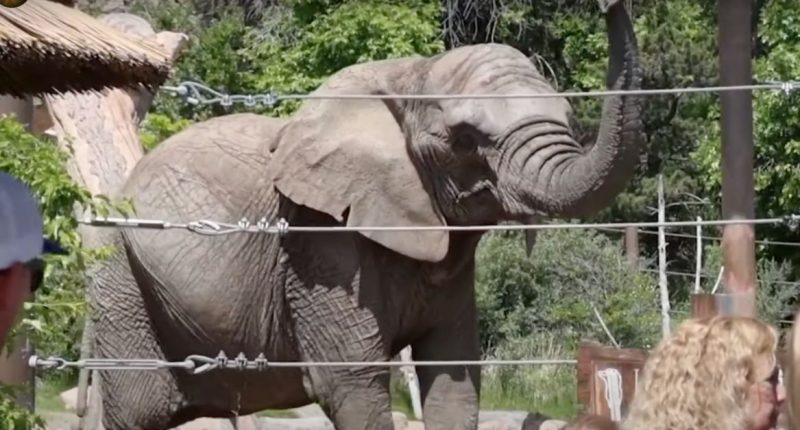
An elephant at the Cheyenne Mountain Zoo in Colorado is shown behind a fence. (screengrab via KCNC-TV)
Colorado’s top court ruled Tuesday that five elephants confined in a local zoo do not have the right to seek habeas corpus relief because no court in the United States “has ever recognized the legal ‘personhood’ of any nonhuman species.”
The Nonhuman Rights Project (NRP), an advocacy organization that seeks legal rights for intelligent animals, filed a petition for a writ of habeas corpus on behalf of five elephants in 2023 to end their “unjust confinement.” According to the group’s website, it uses habeas corpus proceedings specifically as a “centuries-old means of testing the lawfulness of one’s imprisonment before a court,” that had a long history of being used to secure rights for enslaved people, “freeing [them] unequivocally and essentially transforming [them] from a legal thing to a legal person.”
Missy, Kimba, Lucky, LouLou and Jambo are five elephants that NRP said are being confined illegally at the Cheyenne Mountain Zoo in Colorado Springs and should instead be moved to a sanctuary. In its petition, NRP argued that elephants are autonomous and extraordinarily cognitively complex beings with complex biological, psychological, and social needs that cannot be met at a zoo.
“Elephants are meant to live as self-determinative, autonomous beings in the wild,” it argued. “When forced to live in an unnatural environment, they suffer greatly as a result.”
The zoo countered with a motion to dismiss the petition, arguing that elephants lacked standing because Colorado’s habeas corpus statute does not apply to animals. The zoo also argued that the elephants were not mistreated in its facilities. The El Paso County District Court agreed that the animals lacked standing, as the statute only covered claimants who were people.
NRP appealed and the Colorado Supreme Court ruled Tuesday that there is insufficient historical precedent to support elephants having standing to file a habeas corpus petition. In a 21-page ruling, the court said the habeas corpus statute does not apply to nonhuman animals such as elephants, “no matter how cognitively, psychologically, or socially sophisticated they may be.”
Justice Maria Berkenkotter penned the decision for the six-member court and called attention to NRP’s evidence that elephants “share numerous cognitive capacities with humans, including self-awareness, empathy, awareness of death, intentional communication, and the ability to learn and categorize,” as well as elephants’ highly social nature, long-lasting memories, complex communication skills, and propensity to travel in social groups.
However, the judge also discussed the history of Colorado’s habeas corpus statute, which only extended rights to “persons.” Although Colorado law did not define “person,” the court said, there is no precedent to support considering a member of a nonhuman species a “person” for purposes of habeas corpus. Ultimately, the court ruled that “because an elephant is not a person, the elephants here do not have standing to bring a habeas corpus claim.”
More Law&Crime Coverage: ‘We Are Unpersuaded’: Happy the Elephant Isn’t a ‘Person,’ New York’s Highest Court Rules
In the decision, Berkenkotter specifically noted that NRP is not actually seeking freedom from captivity for the elephants. “[I]t was not suggesting that the Zoo should open its gates and set the elephants loose to roam free in Colorado Springs and beyond, any more than it was suggesting that very smart dogs could not be ‘kept’ as house pets,” the judge commented about NRP’s case.
“Instead, it asked to transfer the elephants from the Zoo to a different confinement,” she continued, noting that given the ultimate goal of transferring elephants “from one form of confinement to another is yet another reason that habeas relief is not appropriate here.”
The court ended its decision by commenting that the question before it was narrow and that the protection of nonhuman animals like Missy, Kimba, Lucky, LouLou, and Jambo should be handled by the legislative rather than the judicial branch.
The parties did not immediately respond to a request for comment.
You can read the full decision here.






